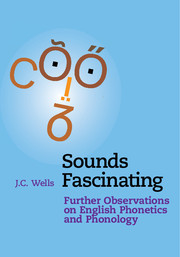2 - Food and Drink Words
from PART I - WORDS, NAMES, PEOPLE, AND PLACES
Published online by Cambridge University Press: 05 September 2016
Summary
Flummery
The cartoonist Steve Bell had a strip in the Guardian in which he shows the Queen saying, ‘One does so enjoy a spot of flummery, does one not?’.
Flummeryˈflʌm(ə)ri is one of the very few words which English has borrowed from Welsh. It comes from llymruˈɬəmri and originally, both in Welsh and English, denoted a kind of porridge. Its earlier etymology is unknown. In English it acquired in time its present meaning ‘flattery, humbug, meaningless trappings’. It's interesting that flummery diversified in this way, while porridge has widened its meaning quite differently, coming to mean ‘jail time, period of imprisonment’.
The initial consonant in Welsh llymru is of course ɬ, the voiceless alveolar lateral fricative, a sound we don't have in English (Sounds Interesting, Section 7.4). As with the name of Shakespeare's stereotypical Welshman Fluellen (Llewelyn) and in the Floyd variant of Lloyd (Welsh llwyd ‘grey’), the English fl captures the distinctive phonetic components of ɬ, while spreading them out over two separate successive segments, the first voiceless and fricative, the second alveolar and lateral. Our modern lame English attempts at ɬ, namely xl and θl, and the ʃl that South Africans sometimes use in Hluhluwe (Zulu ɬuˈɬuːwe) all exemplify the same tactic.
Conchology
As I'm sure you know, a conch is a mollusc, namely a kind of large saltwater snail or its shell. Not only is it edible, its shell can be used as a sort of trumpet (as blown by Triton).
In William Golding's Lord of the Flies, a conch shell is used to call the boys together, and at meetings is held by whoever is speaking, as a symbol of democracy and order.
Anyhow, when I was at school we called it a kɒŋk. Pronouncing it with final k marks the word as being of Greek origin: its immediate Latin source concha is taken from Greek κόγχη kongkhē. (In Greek and Latin it seems to have referred primarily to a mussel rather than to anything larger, but no matter).
- Type
- Chapter
- Information
- Sounds FascinatingFurther Observations on English Phonetics and Phonology, pp. 11 - 15Publisher: Cambridge University PressPrint publication year: 2016

